SWITZERLAND
LANDSLIDES
|
|
ALL ABOUT SWITZERLAND |
|
FLOODINGS LANDSLIDES |
||||
August 2005The most heavy rainfalls since more than 100 years in Switzerland (and ever since precise statistics are available) from Saturday August, 20th to Monday August, 22th have devastated large regions of the country. Five people are reported to have been killed, two are still missing. Estimates of material damages go from 500 million Swiss Francs (333,000 US $) to 2,000 million Swiss Francs (1.3 billion $). Major roads and railroads crossing the alps (St. Gotthard, Lötschberg) have been cut for several days, but Southern Switzerland could always be reached over the San Bernardino route. The Lötschberg railway line is operational again since Wednesday August, 24th. The prealpine regions Entlebuch (west of Lucerne), Obwalden and Bernese Oberland and the roads and railroads between Zurich / Lucerne and St. Gotthard at the foot of prealpine Mount Rigi were hit by landslides and rivers Schächen and Reuss flooded the region around Altdorf (Uri) at the upper end of Lake Lucerne, cutting off the main transit route to southern Switzerland. |
The floods of Rivers Kleine Emme, Reuss, Aare and of many small brooks that have become huge rivers have carried away some roads and bridges and caused the lakes of Sarnen, Lucerne, Thun and Biel to reach their 100 year high level marks.
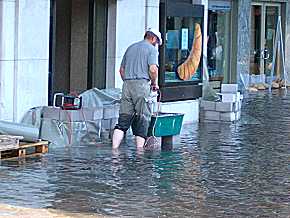 Lucerne, Schwanenplatz, 2005-08-23 provisional walls keep some shops dry |
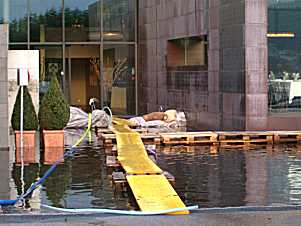 Lucerne, Seeburg, 2005-08-23 |
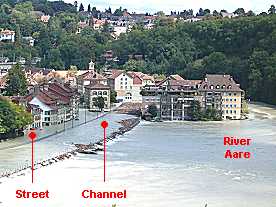 Bern, River Aare and Matte district, 2005-08-24 floating logs blocking the flow of water in the channel are the major problem |
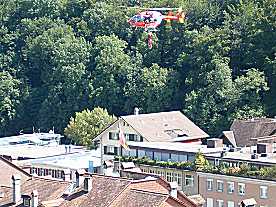 Bern, helicopter operation in Matte district 2005-08-24 |
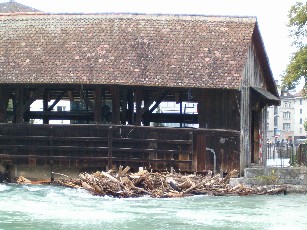 Thun, 2005-08-27 old wooden bridge with driftwood water level is still very high |
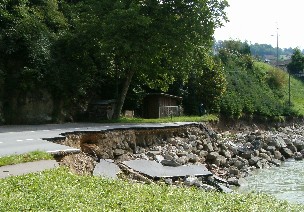 Werthenstein (Entlebuch), 2005-08-27 River Kleine Emme is at normal level again, but the road to Lucerne will be disrupted for some time |
| All fotos © all-about-switzerland.info | |
Major cities were confronted with with inundations: the downtowns of Lucerne and Thun, situated at the lower end of major lakes were flooded for one week (but only 2 feet high) and the cities have been cut into two parts; in Berne the small Matte district at the banks of River Aare had to be evacuated, while 95% of the city (located on hills) remained completely dry and faced no problems at all. Overall these cities, though present in the media, could always easily be reached from outside, there was no shortage of supply, electricity was cut only for very limited number of households and almost everybody went to work within the city or commuted to other places almost as usual.
On the other side some prealpine regions were hit much harder: hundreds of houses in some villages in central Switzerland (Entlebuch, Engelberg, Melchtal, Glarus), several resorts in the Bernese Oberland region (particularly Diemtigtal, Grindelwald, Brienz) and the lower Engadin area in Grisons had to be evacuated and many villages in these regions could not be reached except by helicopters for up to two weeks. Many houses have been severly damaged or completely destroyed by landslides. While the evacuated local population stayed in other houses within the same village, some 1500 tourists have been evacuated within two days from the region.
Rainfalls finally ceased in Switzerland on Wednesday August 24th. On Thursday August, 25th the situation had become a little better in Switzerland: the Engiadin, Bernese Oberland and Uri regions could be reached again by road and/or train at least for supplies, though traffic was still restricted.
August, 26th:
Switzerland's Federal Railways ran one passenger train per hour
and direction from Basel to Ticino on the St. Gotthard main line (instead
of three).
The roads to the villages of Engelberg and Melchtal in canton Obwalden and to some villages in canton Uri (all central Switzerland) were still cut off and many houses there were without electricity and cable-based telephone communication for almost two weeks. Supplies by helicopters were always guaranteed, however.
September, 1st: a provisional road to Engelberg was opened, less than two weeks after the heavy rainfalls. For some time, the railway line will be interrupted, but public transport is guaranteed by buses. Authorities are confident that the railway line can be reopend before christmas so that the will be no shortage in transportation capacity during the winter sports season.
September, 24th: Major shopping facilities in Littau that have been flooded by the waters of River Kleine Emme coming from the Entlebuch region are reopened.
Switzerland's political structures giving as much autonomy and responsibility to the cantons and communes proved to be very adequate to tackle the crisis:
Switzerland's federalist system of government based on extremely distributed political power, though often criticized as complicated and clumsy in normal times, proved to be much more flexible and efficient than large organisations on national level.
Though nobody really waited for national politicians to act immediately, both Switzerland's president (and minister of defense), Samuel Schmid, and the minister of transportation and energy, Moritz Leuenberger, were soon present right at the problem spots, talked with local experts as well as with ordinary people and found words that both encouraged the population and showed respect for their local actions.
Mr. Leuenberger focused on one example of preventive measures that has saved damages of 100 million Swiss Francs at a cost of only 25 million Swiss Francs, a cantonal project planned, decided on in a cantonal referendum and financed mainly by cantonal taxes with some federal subsidies. Mr. Leuenberger announced that he will encourage preventive action in the years to come in joint efforts by the Swiss confederation, the cantons and the communes.
More fotos on this topic: |
||
|
Short quotations allowed but with precise declaration of origin (Link). Reproduction of substancial parts in printed or electronic form only with explicit written consent by the editor. | ||
| Disclaimer | Privacy Policy | www.all-about-switzerland.info © 2005-2010 All Rights Reserved | Editor | ||